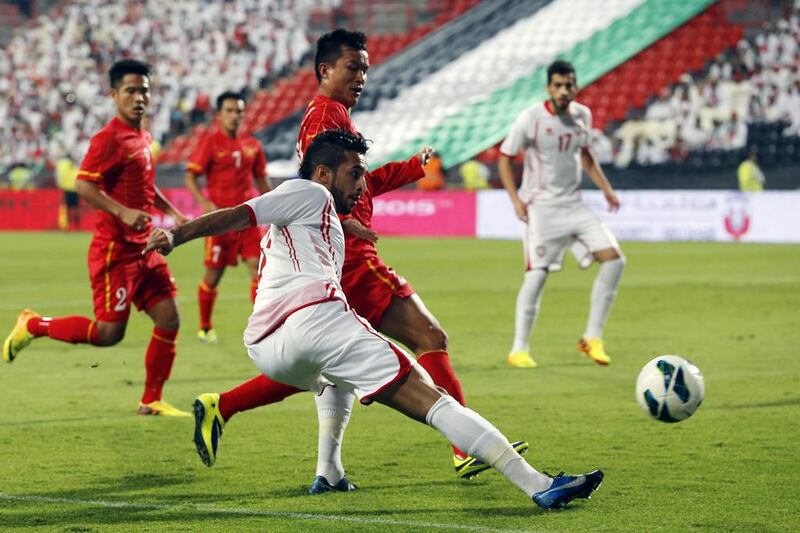He has one of the best strike rates in international football. The young Emirati's goal in the UAE's 5-0 victory over Vietnam in Abu Dhabi on Tuesday means he has scored 17 goals in 16 matches.
Now, the Al Jazira striker looks set to lead the UAE’s attack at the 2015 Asian Cup, starting in Australia in January 2015.
Ali Mabkhout’s fast-tracking through the ranks has been remarkable. At the London Olympics, he was bit-part player for Mahdi Ali’s U23 squad, playing 25 minutes for a team who performed admirably against Uruguay, Great Britain and Senegal.
Since bursting on the international scene with four goals in a 6-2 win over Bahrain in October last year, Mabkhout’s career path has been on a steady upward trajectory.
This season, in particular, Mabkhout has looked a man transformed. Every bouncing ball is an invitation to be hit first time, instinctively. More often than not, those shots end up in the net, or at least on target.
The 23-year-old striker’s international breakthrough has coincided with the hit-and-miss phases of his UAE strike partner, Ahmed Khalil. Where Mabkhout seems to be functioning on pure instinct, Khalil is often racked with hesitation.
His international form runs parallel to his rise in the domestic game; since London, he has 19 goals in 34 league and cup matches for Jazira, living up to Ricardo Oliveira’s prediction, last year, that Mabkhout would soon be the country’s best striker.
He has three goals in four league games for his club this season, but since the most recent, on September 26, he has amassed seven goals for the UAE. He did not start any of the four matches for Jazira, and perhaps that enforced reduction in his work load ensured his freshness for his country.
On Tuesday night at Mohammed bin Zayed Stadium, he was back from a one-match suspension to lead the attack again. His performance veered from the excellent in the first half to disappointing in the second, surprising considering Vietnam’s surrender.
It was clear that part of the UAE’s game plan was to play through balls for Mabkhout to chase. Omar Abdulrahman, in particular, clearly relishes playing with him and consistently looked for him in the early minutes. The full-backs Walid Abbas and Mohammed Fawzi, acting almost as wingers against such defensive opposition, also looked to get the ball to him as early as possible.
The result was that, in the first half, Mabkhout was involved in all of the UAE’s best moments, and there were many.
After six minutes, he powered past Chau Lee Vinh, who had no option but to bring him down, which led to a penalty and a sending off. Hamdan Al Kamali’s spot kick was saved by the Vietnam goalkeeper Nguyen Thanh Binh, but the match was effectively over.
The UAE took advantage of a demoralised Vietnam defence and Mabkhout played a big part in the first two goals, scored by Abbas and the captain, Ismail Matar.
He completed a fine first half with a sweeping finish from Fawzi’s cross after 30 minutes, before Habib Fardan gave the home team a 4-0 half-time lead.
The restart saw the UAE inevitably ease off, and so did Mabkhout, his finishing suddenly sluggish.
One chance, from a sublime Abdulrahman pass, left him in so much space and time he must have thought he was offside. His tame shot was hit straight at the keeper.
Perhaps we have, rather suddenly, come to expect too much from him. Like Abdulrahman, it will be intriguing to see what Mabkhout can do against defenders that will not afford him the almost obscene amount of freedom that the Vietnamese did.
The recent glut of goals, as promising as they are, have come against modest teams.
Thankfully, Mahdi Ali, not a man to be taken by mere stats, already is plotting the next phase in the evolution of his squad: playing teams ranked in the world’s top 40.
“It has been a remarkable year for us and now we need to raise the level for this team to play friendlies against stronger opponents for our future preparations,” he said after the match.
He has just over a year to do that. And should Mabkhout continue his improvement, and his scoring form, he might just emerge as the UAE’s other trump card at Australia 2015.
akhaled@thenational.ae
Follow us on twitter at @SprtNationalUAE





